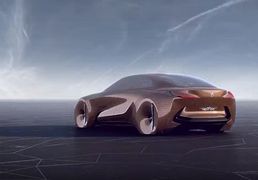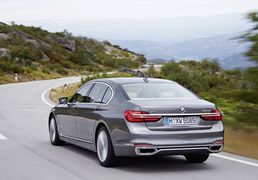TECHNOLOGY: Drivers take a back seat
by Motor News Reporter,
2016-02-04 05:00:00.0
WHILE Kia is aiming at introducing autonomous technology over the next 14 years, the Renault-Nissan Alliance is aiming to be even further up the road by launching more than 10 vehicles with autonomous drive technology in the next four years.
The car group has announced that it will launch a range of vehicles with autonomous capabilities in the US, Europe, Japan and China through 2020. The firm says its new technology will be installed on mainstream, mass-market cars and even claims that the technology will be affordably priced, although affordable is of course a relative term.
In addition, the company says it will launch a suite of new connectivity applications that will make it easier for people to stay connected to work, entertainment and social networks.
"Renault-Nissan Alliance is deeply committed to the twin goals of ‘zero emissions and zero fatalities’," Renault-Nissan Alliance chairman and CEO Carlos Ghosn said. "That’s why we are developing autonomous driving and connectivity for mass-market, mainstream vehicles on three continents."
Renault-Nissan is already the industry’s zero-emission leader thanks to models such as the Nissan Leaf and the Renault Zoe.
In fact the Alliance has sold nearly 300,000 all-electric vehicles in the past six years.
The company says that safety and efficiency of vehicles across the Renault and Nissan brands have increased dramatically. It says that fatal and serious injuries in Nissan vehicles in Japan decreased 61% in 20 years while fatal and serious injuries in Renault vehicles in France decreased 80% in 15 years.
Autonomous drive is expected to help further reduce driver error, which is responsible for up to 90% of all fatalities.
This year will mark the debut of vehicles with Single-Lane Control, a feature that allows cars to drive autonomously on highways, including in heavy, stop-and-go traffic. In 2018, both companies will launch vehicles with Multiple-Lane Control, which can autonomously negotiate hazards and change lanes during highway driving. And 2020 will see the launch of Intersection Autonomy, which can navigate city intersections and heavy urban traffic without driver intervention.
Later this year the alliance will launch a new automotive app for mobile devices, which allows remote interaction with your car. Next year, it will launch the first Alliance Multimedia System, providing new multimedia and navigation features, as well as improved smartphone integration and wireless map updates. In 2018, the Alliance Connectivity and Internet of Things platform will support the new Virtual Personal Assistant feature for individual and business customers.
The company says that all of the alliance’s autonomous drive technology will be available at the option of the driver.
In 2014, Renault-Nissan converged both companies’ engineering organisations. Engineers at Renault and Nissan work together as one team to reduce duplication in the development of next generation technologies. The technology the engineers develop together is then available for each company and all brands to use where it makes sense for consumers.
In other words, the engineers have developed a "technology tool kit," including hardware and software applications. Product teams from Renault, Nissan, Infiniti and other alliance brands may select those applications for their models, where appropriate. By partnering on advanced research and development, the brands are able to work more efficiently, with less cost.
-

Nissan is testing an autonomous version of its Leaf electric vehicle. Picture: NEWSPRESS UK
-

CEO of the Renault-Nissan Alliance, Carlos Ghosn, tries not to look too nervous as the driver takes his hands off the wheel. Picture: NEWSPRESS UK
-

Expect to be able to park your car with an app quite soon. Picture: NEWSPRESS UK
WHILE Kia is aiming at introducing autonomous technology over the next 14 years, the Renault-Nissan Alliance is aiming to be even further up the road by launching more than 10 vehicles with autonomous drive technology in the next four years.
The car group has announced that it will launch a range of vehicles with autonomous capabilities in the US, Europe, Japan and China through 2020. The firm says its new technology will be installed on mainstream, mass-market cars and even claims that the technology will be affordably priced, although affordable is of course a relative term.
In addition, the company says it will launch a suite of new connectivity applications that will make it easier for people to stay connected to work, entertainment and social networks.
"Renault-Nissan Alliance is deeply committed to the twin goals of ‘zero emissions and zero fatalities’," Renault-Nissan Alliance chairman and CEO Carlos Ghosn said. "That’s why we are developing autonomous driving and connectivity for mass-market, mainstream vehicles on three continents."
Renault-Nissan is already the industry’s zero-emission leader thanks to models such as the Nissan Leaf and the Renault Zoe.
In fact the Alliance has sold nearly 300,000 all-electric vehicles in the past six years.
The company says that safety and efficiency of vehicles across the Renault and Nissan brands have increased dramatically. It says that fatal and serious injuries in Nissan vehicles in Japan decreased 61% in 20 years while fatal and serious injuries in Renault vehicles in France decreased 80% in 15 years.
Autonomous drive is expected to help further reduce driver error, which is responsible for up to 90% of all fatalities.
This year will mark the debut of vehicles with Single-Lane Control, a feature that allows cars to drive autonomously on highways, including in heavy, stop-and-go traffic. In 2018, both companies will launch vehicles with Multiple-Lane Control, which can autonomously negotiate hazards and change lanes during highway driving. And 2020 will see the launch of Intersection Autonomy, which can navigate city intersections and heavy urban traffic without driver intervention.
Later this year the alliance will launch a new automotive app for mobile devices, which allows remote interaction with your car. Next year, it will launch the first Alliance Multimedia System, providing new multimedia and navigation features, as well as improved smartphone integration and wireless map updates. In 2018, the Alliance Connectivity and Internet of Things platform will support the new Virtual Personal Assistant feature for individual and business customers.
The company says that all of the alliance’s autonomous drive technology will be available at the option of the driver.
In 2014, Renault-Nissan converged both companies’ engineering organisations. Engineers at Renault and Nissan work together as one team to reduce duplication in the development of next generation technologies. The technology the engineers develop together is then available for each company and all brands to use where it makes sense for consumers.
In other words, the engineers have developed a "technology tool kit," including hardware and software applications. Product teams from Renault, Nissan, Infiniti and other alliance brands may select those applications for their models, where appropriate. By partnering on advanced research and development, the brands are able to work more efficiently, with less cost.

























Change: 0.60%
Change: 0.63%
Change: 0.47%
Change: 0.73%
Change: 0.27%
Data supplied by Profile Data
Change: 0.30%
Change: -0.31%
Change: 0.60%
Change: 0.00%
Change: -0.32%
Data supplied by Profile Data
Change: 0.58%
Change: 0.60%
Change: 0.68%
Change: 1.06%
Change: 0.00%
Data supplied by Profile Data
Change: 0.83%
Change: 0.74%
Change: 1.28%
Change: 0.00%
Change: -0.32%
Data supplied by Profile Data